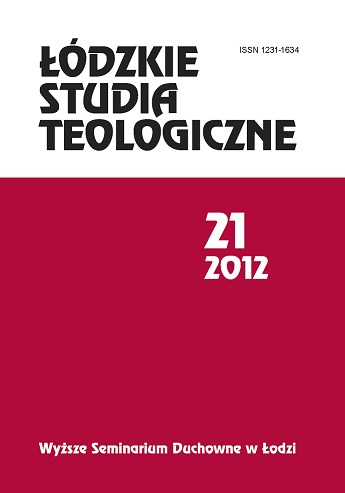The action of God in human life. Towards experiential dimension of effects of grace
The action of God in human life. Towards experiential dimension of effects of grace
Author(s): Andrzej Piotr PerzyńskiSubject(s): Metaphysics, Philosophy of Religion, Biblical studies, Sociology of Religion, History of Religion
Published by: Wyższe Seminarium Duchowne w Łodzi
Keywords: grace; existence; experience; nature; the effects of grace; forgiveness; cure; elevation; release; liberation from sin;
Summary/Abstract: As in the Scriptures, just as in the first non-canonical texts of primitive Christianity, the Fathers of the Church, we find very diverse ways of understanding grace in itself, its action in man, its role in the whole work of salvation. This is obviously the result of different cultural conditions of particular Churches, a different social situation, as well as different personalities, different spiritual and intellectual formation of individual theologians. The Western tradition of speaking about grace is primarily about her relationship to sin. In the ancient Western Church, the teaching of grace is definitely influenced by Saint. Augustine. It is from him beginning that one can speak of theology of grace in the strict sense. The basic questions of theology are questions about the essence and types of grace, about the relationship between grace and nature, the limits of grace, and thus also the limits of predestination. It is different in Eastern tradition. The concept of grace appears usually in a wreath of such concepts as: justification, salvation, purification, forgiveness, and sin. The central idea of Eastern theology is the deification of man as the ultimate goal of the educational process. The article presents briefly the idea of the German Jesuit Karl Rahner (1904-1984), who claimed that God's action in human life can become the subject of experience. Rahner strongly emphasizes that grace remains a permanent mystery, because it is the introduction of man into the most original mystery, the mystery of the life of the Trinity, and therefore - alongside the Incarnation - it is one of the three greatest mysteries of Christianity and the whole reality. Grace is something as divine as possible, and at the same time something that defines human being as something most objective, real, and at the same time something as personal as relational (as the existence of God's Persons is existence in a relationship).
Journal: Łódzkie Studia Teologiczne
- Issue Year: 21/2012
- Issue No: 1
- Page Range: 209-222
- Page Count: 14
- Language: English

